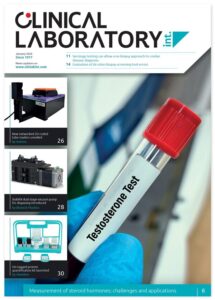New standards aim to enhance clinical trial data sharing and reuse
The Clinical Research Data Sharing Alliance (CRDSA) has released two new standards aimed at improving the sharing and reuse of anonymised individual patient data from clinical trials. The standards, published on 26 September 2024, seek to address common challenges faced by both data contributors and researchers in areas such as metadata, data completeness and utility.
Promoting data quality and consistency
The first of the two standards, CRDSA Std 1001: Standard for Sharing Clinical Study Data https://bit.ly/3ZV3ucN , focuses on enhancing data completeness, consistency, interoperability and information transparency. These qualities are crucial for maximising the value of shared clinical trial data for the research community.
By providing clear guidelines for data sharing, the standard aims to ensure that the time and resources invested by data contributors in preparing datasets will lead to meaningful research outcomes. This approach is expected to benefit both the contributors and the broader scientific community.
Ramona Walls, Executive Director of C-Path and Co-Chair of the CRDSA Secondary Use Standards Work Group, emphasised the complementary nature of the standards: “The standards are complementary and intended to work together to facilitate good science. The standards establish consistent guidelines for responsibly sharing clinical study data and conducting robust secondary analyses of
that data to advance scientific knowledge.”
Enhancing secondary analyses
The second standard, CRDSA Std 2001: Standard for Secondary Analysis of Clinical Study Data https://bit.ly/4dL7Wy7 , addresses the need for robust analytical approaches when working with shared patient data. This standard covers the entire research process, from initial data acquisition to the interpretation and reporting of results.
By providing a framework for secondary analyses, the standard aims to reduce the risk of inadvertent errors or bias that could lead to misleading conclusions. This is particularly important given the potential impact of such findings on scientific understanding and patient care.
Potential applications and impact
The newly published standards have the potential to be applied in various scenarios within the clinical research ecosystem. Research funders may adopt these standards to ensure that the projects they support adhere to best practices in data sharing and analysis. Pharmaceutical companies and other sponsors of clinical trials could use the guidelines to inform their data governance policies, ensuring that valuable patient data
is shared responsibly and effectively.
Additionally, scientific journal editors may find these standards useful when evaluating submitted research that involves secondary analyses of clinical trial data. By encouraging adherence to these standards, journals can help maintain the quality and reliability of published research.
Aaron Mann, CEO of CRDSA, highlighted the significance of this development: “Developing standards for patient data reuse was a core objective when we launched CRDSA in 2021. Publication of these standards is a significant milestone and the culmination of three years of hard work by a diverse and talented group of volunteer leaders. We look forward to working with the scientific community to adopt and implement these standards and realise the full research value of patient data.”
Addressing long-standing challenges
The publication of these standards represents an important step in addressing long-standing challenges in the field of clinical research data sharing. Despite the high quality of data generated through clinical trials, its value for further research has often been limited by inconsistencies in sharing practices and analytical approaches.
By providing clear guidelines for both data contributors and researchers, the CRDSA standards aim to unlock the full potential of clinical trial data. This could lead to more efficient and effective clinical research processes, improved trial design and execution, and ultimately, faster development of new therapies for patients.
Respecting patient contributions
An often-overlooked aspect of clinical trial data sharing is the respect it shows for the patients who participate in these studies. By ensuring that their data is used responsibly and effectively, these standards honour the time and effort that patients contribute to the clinical development process.





